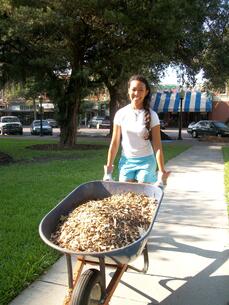This post was written by NobleHour Special Contributor Natasha Derezinski-Choo.

When returning to school, kick some of the nervousness by being prepared. Consider how last year went, and decide what went well and what you’d like to do differently. Here are some tips for kicking bad habits of schooldays past, and starting the year anew ready to improve.
-
Hit the Ground Running: Don’t wait for the first report card to improve your habits. A new year with new teachers and classes means a fresh start for students. It’s the opportunity to do better and break old habits. Each year there are courses more challenging from the last, so think ahead as to what subjects you may need to give more attention to this year. Study and review a little each day so you know all the material so you aren’t cramming. Pull yourself out of the ease of summer and start on homework the day you receive it—yes, even on the first day—to break any old habits of procrastination. Don’t fall behind on the first week, or it will just become more and more difficult to catch up.
-
Stay Organized: One of the worst feelings is having done an assignment but having left it at home on the day it’s due. Devise a system of organization on the first week. Know what belongs in each binder, notebook, or folder so that by midterms you aren’t searching to find notes among a pile of papers haphazardly thrown into your backpack. If your teacher allows it, periodically discard old papers you don’t need, but never through out notes and study materials you may need later. Instead store those at home so you don’t have to carry around weight that you won’t need for class on a day-to-day basis, but you’ll still have them come finals. One year my teacher had a poster reading, “Organization is the key to success” above her blackboard, and it’s true. Instead of spending time looking for things, you can use your time on the things that really matter.
-
Manage Your Time: In addition to managing books and papers you’ve got to manage your time. If you’ve ever found yourself up at 2 a.m. gluing together a history project, regretting the time you spent not working on it earlier, you’ve learned the hard way the importance of using your time wisely. Always keep in mind what the week ahead looks like. Consider how your days with practices, games, meetings, or other extracurricular activities could conflict with tests or major deadlines, and get ahead on assignment or studying you won’t have time for later in the week. This way you can keep doing your fun activities without sacrificing academics. If your school doesn’t provide you with one, think about picking up a weekly planner to write down all your assignments, tests, and activities. If you let assignments pile up you won’t be able to do your best. Managing your time properly alleviates stress and allows you more free time to do the things you love.
-
Get Involved: At school there are many opportunities to be involved with clubs and sports. This is the chance to do something you enjoy and meet people with similar interests. You’ll make friends, gain experience, and get more out of you education. It’ll also boost applications or resumes. The hardest part for some students is knowing where to start. Make sure you take advantage of any club fairs or interest meetings your school may host so you know what might interest you. Talk to the teachers who help organize, coach, or advise for different clubs and athletics. If you’re still lacking some confidence, talk to another student involved or bring a friend along.
-
Ask Your Teachers for Help: Teachers are there to help you, so don’t be shy to ask. If you find yourself in a tough spot with the material, talk to your teacher after class to get advice on getting some extra help. If on a particular week you’re stressed despite your time management with lots of assignments or tests coincidentally at the same time, explain to your teachers the situation ahead of time to see if you can get an extension, but don’t make a habit of it, and I wouldn’t advise coming the day before with excuses. Teachers should be interested in your success, so don’t be afraid to ask for their advice and help when you need it.
Learning is the most important part of school. As you return to school, consider trading in bad habits from last year for better ones this year. This process of learning about your own capabilities should continue throughout the year. Constantly evaluate what techniques are working that you should keep up with, and what’s not helping and needs to be changed or improved. Here are just a few tips, but each individual must understand his or her own learning style in order to achieve. Good luck in the new school year!



 It combines the exposure of a Facebook Page, the customizability of a website, and the simplicity of a business card on a network of motivated individuals looking to improve the world. An Organization Profile is ideal for local non-profits, businesses, schools, clubs, etc. looking to expand their outreach by increasing their presence online. On NobleHour it’s easy and free for an organization to make itself visible and accessible to potential volunteers, interns, members, and employees, and expand your connectedness online by linking your NobleHour to social networking. Organization Profiles allow you to build connections with people interested in being part of your success. Learn how starting your free Organization Profile today can benefit your organization.
It combines the exposure of a Facebook Page, the customizability of a website, and the simplicity of a business card on a network of motivated individuals looking to improve the world. An Organization Profile is ideal for local non-profits, businesses, schools, clubs, etc. looking to expand their outreach by increasing their presence online. On NobleHour it’s easy and free for an organization to make itself visible and accessible to potential volunteers, interns, members, and employees, and expand your connectedness online by linking your NobleHour to social networking. Organization Profiles allow you to build connections with people interested in being part of your success. Learn how starting your free Organization Profile today can benefit your organization.





 8. Visit Nursing Homes: Visit the elderly and keep them company by reading books, playing games, or just chatting for a while. Help host events and activities. Tech-savvy teens can help someone connect with email or social networking to keep in touch with distant relatives. Just spending some time with a senior citizen can brighten his or her day and yours too. You’ll make new friends and hear stories outside the texting and tweeting generation.
8. Visit Nursing Homes: Visit the elderly and keep them company by reading books, playing games, or just chatting for a while. Help host events and activities. Tech-savvy teens can help someone connect with email or social networking to keep in touch with distant relatives. Just spending some time with a senior citizen can brighten his or her day and yours too. You’ll make new friends and hear stories outside the texting and tweeting generation. 
 Critics would also challenge the amount of money being put into volunteerism abroad. With the hundreds and thousands of dollars people spend for their travel and accommodations while volunteering, many warn against “the dark side of our desire to help the developing world” as put by Ian Birrel in his article “Before you pay to volunteer abroad, think of the harm you might do”. Birrel warns that “orphanages are a booming business trading on guilt [. . .] Those ‘orphans’ might have been bought from impoverished parents [. . . ]An official study found just a quarter of children in these so-called orphanages have actually lost both parents. And these private ventures are proliferating fast.” The trouble with so many more tourists wanting to enrich their vacations with volunteering is that it becomes a disturbing industry where locals can profit on Westerners’ consciences. Thousands of organizations encourage people to volunteer with their organization, but often these short excursions do more harm for local communities in the developing world. They take away jobs from skilled locals and give them to volunteers who will pay to work there. Often the money spent by volunteers to travel abroad would be better used cultivating new industries and building infrastructure to help developing nations grow, rather than keeping them dependent on the developed world.
Critics would also challenge the amount of money being put into volunteerism abroad. With the hundreds and thousands of dollars people spend for their travel and accommodations while volunteering, many warn against “the dark side of our desire to help the developing world” as put by Ian Birrel in his article “Before you pay to volunteer abroad, think of the harm you might do”. Birrel warns that “orphanages are a booming business trading on guilt [. . .] Those ‘orphans’ might have been bought from impoverished parents [. . . ]An official study found just a quarter of children in these so-called orphanages have actually lost both parents. And these private ventures are proliferating fast.” The trouble with so many more tourists wanting to enrich their vacations with volunteering is that it becomes a disturbing industry where locals can profit on Westerners’ consciences. Thousands of organizations encourage people to volunteer with their organization, but often these short excursions do more harm for local communities in the developing world. They take away jobs from skilled locals and give them to volunteers who will pay to work there. Often the money spent by volunteers to travel abroad would be better used cultivating new industries and building infrastructure to help developing nations grow, rather than keeping them dependent on the developed world.






